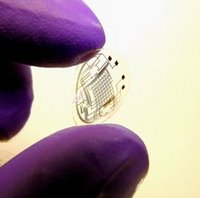Arnievision
 One of the bits of chrome I drizzled throughout the rifters books were "Tactical Contacts" ("ConTacs", in the vernacular): contact lenses that acted as a kind of personal GUI, feeding information to the wearer and using the roving eyeball itself as a kind of trackball pointer. Yves Scanlon wore them sometimes; Patricia Rowan would have rather have been caught naked in public than with her eyes unTacked. (Come to think of it, the masking of eyes was a consistent general motif throughout those books. Which is kind of an interesting inversion of the usual sort of mask, which covers everything except the eyes. But I digress.)
One of the bits of chrome I drizzled throughout the rifters books were "Tactical Contacts" ("ConTacs", in the vernacular): contact lenses that acted as a kind of personal GUI, feeding information to the wearer and using the roving eyeball itself as a kind of trackball pointer. Yves Scanlon wore them sometimes; Patricia Rowan would have rather have been caught naked in public than with her eyes unTacked. (Come to think of it, the masking of eyes was a consistent general motif throughout those books. Which is kind of an interesting inversion of the usual sort of mask, which covers everything except the eyes. But I digress.)Anyway, the guys over at the University of Washington claim to have developed a working prototype.
I don't know if I buy this. My understanding is that a passive ConTac-type display is probably unworkable in principle because of the eye's focal length: you just can't focus clearly on anything close enough to sit on your cornea (my own whacked-out version got around this by shooting images directly onto the retina using a teensy lenticular laserium setup, but I don't remember if I actually spelled that out in the books). The UW PR flack doesn't address this issue at all, and in fact the researchers don't even seem to have generated a visible image using the technology. Their main claim to fame so far is that they've been able to embed circuits into a contact lens and plunk it down on a rabbit's eyeball for twenty minutes without killing him, which is certainly necessary albeit not sufficient. That doesn't stop them from cheerfully predicting that Terminator-vision is just around the corner, though.
But they must have solved that problem. They wouldn’t be going on like this if they hadn't addressed such an obvious hurdle. Nobody could be that dumb. I mean, that would be about as likely like a famous geneticist claiming that Human evolution had stopped because God likes us the way we ar— oh, wait...
Photo credit, as far as I can tell, is University of Washington Weekly.
Labels: relevant tech

3 Comments:
Just think: I could watch "Blade Runner" *all day*.
I can sometimes (fleetingly) focus on the gunk that floats around on my cornea, seeing in macroscopic vision for the instant before it jerks out of the way. (Dammit, you've made me try to focus on my own cornea now. I'm about to go all cross-eyed...)
Dunno, you might be able to read a specially engineered fuzzy display if you unfocus.
Oh dear. Deconvolution!
denni, have you played with 2D Fourier transforms? Because I think you might have it. Any clear sharp image written on the cornea is of course invisible on the retina because it's been fuzzed out.
If you could fuzz out the image written on the cornea in the opposite way that your eye will... it's called deconvolution and I bet it won't work for any big, detailed image. Because your cornea has sharp edges, and those sharp clear edges will show up as interference on your retina.
But I bet you could get something simple, like a pie chart or a couple letters at a time.
Post a Comment
Links to this post:
Create a Link
<< Home